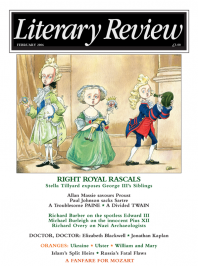Christopher Coker
Most Of Us Survived
The Cold War
By John Lewis Gaddis
Allen Lane The Penguin Press 333pp £20
‘A frightful queerness has come into life,’ wrote H G Wells in his last published work. Perhaps, the most frightful thing about life in 1945 was that it did not seem queer enough. The world had grown used to war. It was Wells's generation that seemed naïve in ever thinking that war could be fought to end war itself. In the ruins of Europe following the fall of the Third Reich, Wells seemed confirmed in his conviction that war would never end, unless that is war itself extinguished the human race. ‘There is no way out or around or through the impasse... It is the end,’ he concluded despairingly.
In this strikingly clear and sober work the great doyen of Cold War historians, John Lewis Gaddis, begins with another voice of the time, one almost as despairing. It is that of the 43-year-old Eric Blair, or George Orwell. In 1946, the year that Wells died, he rented a house

Sign Up to our newsletter
Receive free articles, highlights from the archive, news, details of prizes, and much more.@Lit_Review
Follow Literary Review on Twitter
Twitter Feed
How to ruin a film - a short guide by @TWHodgkinson:
Thomas W Hodgkinson - There Was No Sorcerer
Thomas W Hodgkinson: There Was No Sorcerer - Box Office Poison: Hollywood’s Story in a Century of Flops by Tim Robey
literaryreview.co.uk
How to ruin a film - a short guide by @TWHodgkinson:
Thomas W Hodgkinson - There Was No Sorcerer
Thomas W Hodgkinson: There Was No Sorcerer - Box Office Poison: Hollywood’s Story in a Century of Flops by Tim Robey
literaryreview.co.uk
Give the gift that lasts all year with a subscription to Literary Review. Save up to 35% on the cover price when you visit us at https://literaryreview.co.uk/subscribe and enter the code 'XMAS24'